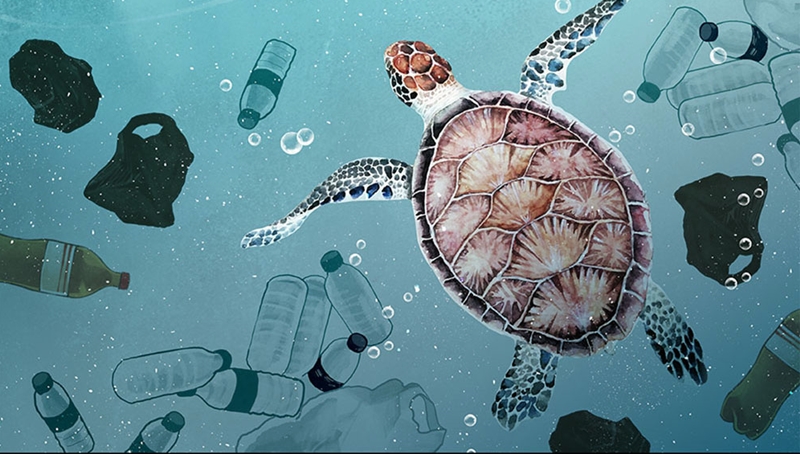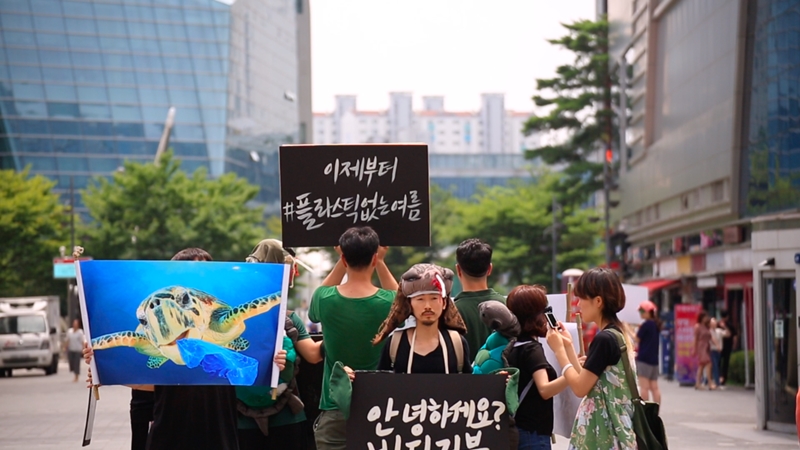
Night of Sseudongshi, a gathering of people for sharing poems on trash and the resulting environmental pollution that threatens the lives of animals, was held on July 25 at Ilmin Museum of Art in Seoul's Jongno-gu District. (iclickart)
By Kim Hyelin and Lee Jihae
Seoul | July 25, 2019
"So what happened?
What do you think happened?
What won't last a century
Leaves something for a millennium
And destroys 10,000 years."
The poem on trash and animals above, "Question," was written by poet Yoo Hee-kyung. It warns of how trash discarded by humans is threatening the lives of animals amid the growing global problem of environmental pollution.
A group of people gathered on July 25 at Ilmin Museum of Art in Seoul's Jongno-gu District to share poems about the threat posed to animals by garbage. The meeting's name "Night of Sseudongshi" is derived from an acronym of "Sseuraegiwa Dongmulgwa Shi," which means "Trash, Animals and Poetry" in Korean.
Sseudongshi (쓰동시) is a month-long project held in July by the civic organization Animal Carnival. The group gathered and disseminated on social media poems on pollution and its threat to animals, as well as distributing clips and visual aids to raise public awareness of the issue.
Dressed as sea creatures, Sseudongshi members have also held campaigns in popular districts of Seoul such as Gangnam-gu District and Hongdae to encourage wider use of eco-friendly tumblers instead of disposable cups.

Participants of the Sseudongshi campaign gather on July 23 in Seoul's Sangam-dong neighborhood dressed as sea life creatures and hold signs asking the public to reduce plastic use. (Magazine SSSSL)
Writers and attendees in Night of Sseudongshi also read out loud selections from the estimated 100 poems they had gathered throughout the month. The announcement of the results of studies conducted by Doctor Kim Sanha, managing director of the Biodiversity Foundation, also showed the harm inflicted by garbage on the domestic ecosystem.
Kim Hanmin of Sea Shepherd Korea, a non-governmental ocean conservation organization that co-organized the project, said, "Just as poetry requires brevity and uses few words, we strongly urge the public to reduce the volume of trash."
Director Kim started his presentation by wearing a hat depicting a turtle bleeding due to a plastic inside its nostrils, and went on to discuss sea turtles, seagulls and other creatures whose bodies were filled with plastic.
"It is tragic that animals are dying from eating plastic or being tied down by trash," he said.
"The best thing to do is not to use plastic."
Ryu Kyung-keun, a participant of the event, said, "For the sake of human convenience, we've deprived animals of the right to health. These animals don't even know why they're suffering."
"We shouldn't separate animals and humans. We're all the same creatures that can feel pain, and we have to be aware of that."
Shin Jihee, who attended the Night of Sseudongshi with her friend, said, "The combination of scientific data and poems made the message more compelling."
"It struck a chord when I heard both the results of the study and the poems. They made me reflect on how I've unconsciously used plastic in my daily life."
The final gathering of Sseudongshi is slated for July 27 at Seoul Upcycling Plaza. Writing and drawing contests, lectures and other events will seek to further promote public awareness of the detrimental effects of trash on animals.
kimhyelin211@korea.kr